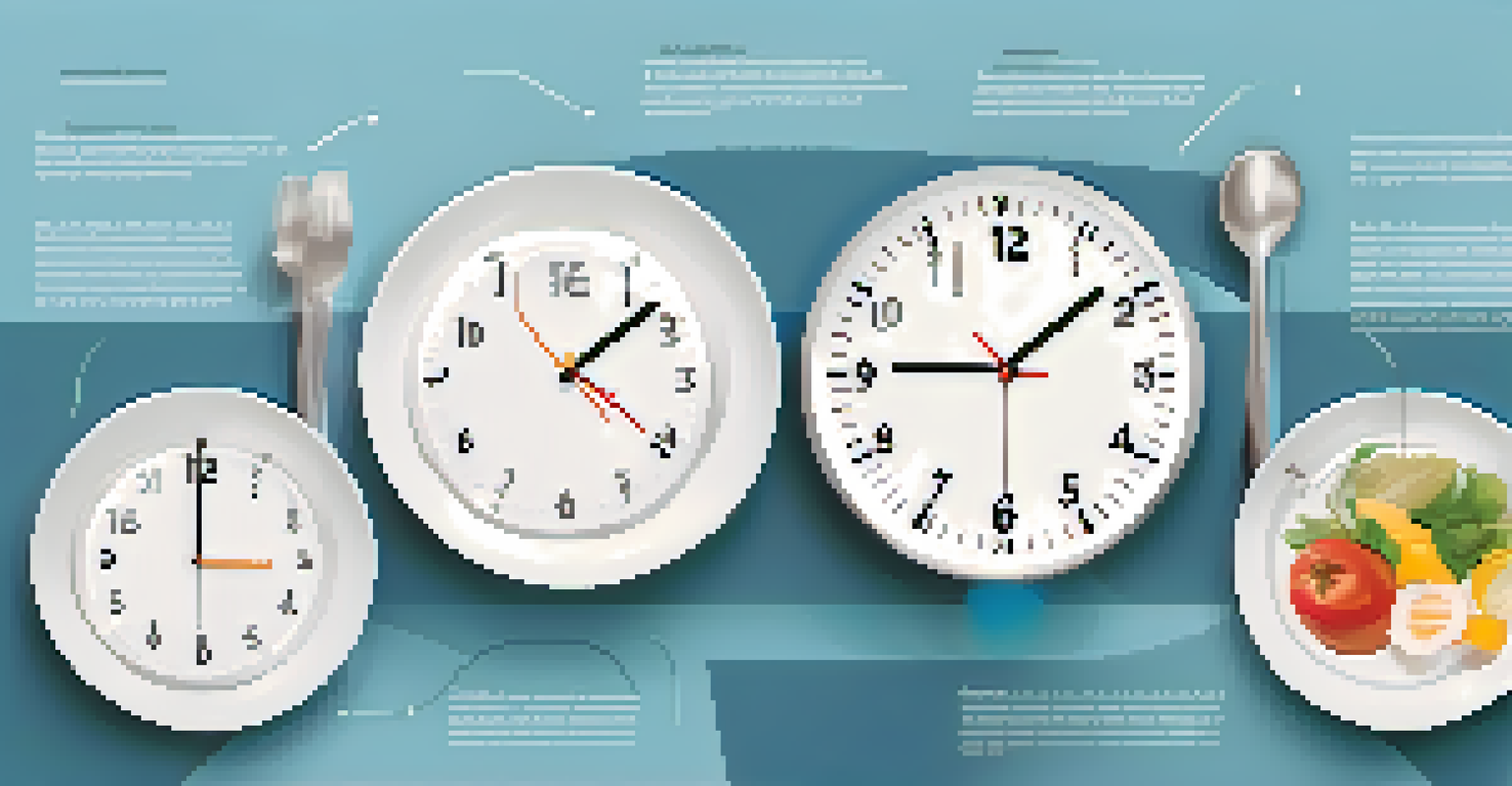Biohacking Your Diet: Intermittent Fasting Explained

What is Intermittent Fasting and Why Try It?
Intermittent fasting (IF) is a dietary approach that alternates between periods of eating and fasting. It's not about what you eat, but rather when you eat. Many people find it appealing as it simplifies meal planning and can lead to weight loss and improved metabolic health.
The greatest wealth is health.
By focusing on time instead of food choices, IF can be less restrictive than traditional diets. It allows flexibility, making it easier to integrate into various lifestyles. For example, you might choose to eat only between noon and 8 PM, allowing you to skip breakfast without feeling deprived.
Research suggests that intermittent fasting may boost brain function, enhance longevity, and improve overall health markers. It’s like giving your body a break from constant digestion, allowing it to focus on repair and rejuvenation during fasting periods.
The Science Behind Intermittent Fasting
Intermittent fasting triggers several biological processes that enhance health. When you fast, insulin levels drop and fat cells can release stored glucose for energy. This can facilitate weight loss and improve insulin sensitivity, which is vital for metabolic health.

Moreover, fasting activates autophagy, a process where your body cleans out damaged cells and regenerates new ones. Think of it as a cellular spring cleaning that promotes better health and longevity. This is one reason why many biohackers embrace IF—it’s about optimizing your body’s natural processes.
Intermittent Fasting Simplifies Eating
This dietary approach focuses on when to eat rather than what to eat, making meal planning easier.
Studies have shown that intermittent fasting can lead to improvements in inflammation, cholesterol levels, and even brain health. These changes can contribute to a lower risk of chronic diseases, making IF an appealing option for those interested in longevity and vitality.
Different Methods of Intermittent Fasting
There are several popular methods of intermittent fasting, each varying in structure and flexibility. The 16/8 method involves fasting for 16 hours and eating during an 8-hour window, making it one of the most popular choices for beginners.
Fasting is the greatest remedy—the physician within.
Another method is the 5:2 diet, where you eat normally for five days a week and restrict calories to about 500-600 for two non-consecutive days. This approach is often easier for those who prefer not to fast daily, allowing for more food variety.
Lastly, there's the eat-stop-eat method, where you fast for a full 24 hours once or twice a week. This might be more challenging but can yield significant results for those who can handle it. Choosing the right method depends on your lifestyle and preferences.
Benefits of Intermittent Fasting
Intermittent fasting offers a multitude of benefits that extend beyond weight loss. Many people report increased energy levels and improved mental clarity, likely due to the hormonal changes that occur during fasting.
Additionally, IF can help regulate appetite, making it easier to resist unhealthy snacks and overeating. By narrowing your eating window, you might find yourself more mindful of what you consume, leading to healthier food choices.
Health Benefits of Intermittent Fasting
Research indicates that intermittent fasting can enhance metabolic health, boost brain function, and promote longevity.
Some studies suggest that intermittent fasting may even promote heart health by improving blood pressure and cholesterol levels. Overall, these benefits contribute to a more balanced and health-conscious lifestyle.
Potential Challenges of Intermittent Fasting
While intermittent fasting can be beneficial, it’s not without its challenges. Many beginners may experience hunger pangs, fatigue, or irritability as their bodies adjust to this new eating pattern. It often takes time for your body to adapt to fasting.
Social situations can also pose a challenge, especially if meals with friends or family do not align with your fasting schedule. Navigating these scenarios requires some planning and communication, but it’s absolutely doable.
It’s essential to listen to your body and recognize when fasting isn’t suitable for you. If you have a history of eating disorders, diabetes, or other health conditions, consulting a healthcare professional before starting intermittent fasting is crucial.
How to Get Started with Intermittent Fasting
Starting intermittent fasting can be as simple as choosing a method that fits your lifestyle. Begin with the 16/8 method, as it’s often the easiest way to dip your toes into fasting. Start by skipping breakfast and gradually adjust your eating window as you become more comfortable.
It’s helpful to keep track of your meals and fasting periods, using an app or journal. This allows you to see what works for you and helps maintain accountability. Additionally, staying hydrated during fasting is essential, so drink plenty of water, herbal teas, or black coffee.
Challenges of Starting Intermittent Fasting
Beginners may face hunger and fatigue as their bodies adjust, and it's important to consider personal health conditions before starting.
As you progress, pay attention to how your body responds. You may find that your energy levels increase and cravings decrease, making it easier to stick with your new routine. Remember, the goal is to create a sustainable practice that enhances your overall well-being.
Final Thoughts on Biohacking Your Diet with IF
Intermittent fasting can be an effective tool for biohacking your diet and optimizing your health. By understanding how to implement this approach, you can harness the benefits it offers while making it work for your lifestyle.
Ultimately, the key is to be patient and flexible. Like any dietary change, it takes time to see results, and what works for one person may not work for another. Embrace the journey and adjust your fasting plan as needed.

As you embark on this journey, remember that the focus is on improving your overall health and well-being. With the right mindset and practices, intermittent fasting can lead to a more balanced and fulfilling life.